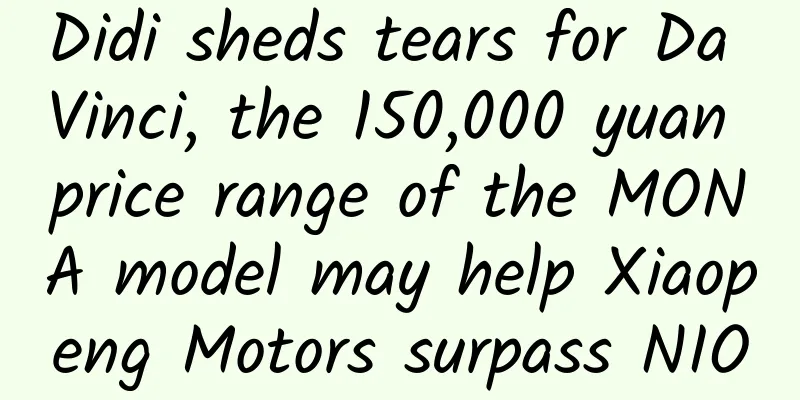Didi sheds tears for Da Vinci, the 150,000 yuan price range of the MONA model may help Xiaopeng Motors surpass NIO

|
After more than two years of planning, Didi finally chose to give up! At the end of August, Didi Chuxing and Xiaopeng Motors announced a strategic cooperation. Xiaopeng Motors will acquire Didi's smart car development business assets for a total consideration of HK$5.835 billion. The acquisition consideration will be completed in the form of additional shares, with a maximum of 91.13 million shares, accounting for about 5% of the enlarged share capital. During this period, Didi will sell Xiaopeng the assets and R&D capabilities related to the smart electric vehicle project, and Xiaopeng Motors will build an A-class smart electric vehicle based on this, with the project codename "MONA". It is reported that as the first product of its new brand, this model has a differentiated advantage over Xiaopeng Motors' existing brand and is expected to be mass-produced and launched on the market by Xiaopeng Motors in 2024. MONA debuts, and "Da Vinci" becomes historyThe new brand models of Xiaopeng and Didi will be differentiated from Xiaopeng's existing brand products. Didi will open its full ecosystem empowerment to Xiaopeng Motors for the first time, providing strong support for "MONA" in multiple dimensions including smart cockpit, intelligent driving and shared travel market, helping Xiaopeng Motors to create popular models in the "150,000-level" price range. He Xiaopeng, chairman of Xpeng Motors, said that the MONA model is the beginning of Xpeng's second or even third brand. The brand will focus on 2C while taking 2B into consideration. A few models will target shared travel, but the most important thing is to create high-level unmanned driving. He Xiaopeng is optimistic about the sales competitiveness of this product. He pointed out that the annual sales volume is at least 100,000 and is expected to be much higher than this figure. According to the announcement, the share issuance will be divided into four phases. First, 58.1642 million shares will be issued at the issue price on the acquisition delivery date; second, 4.6364 million shares will be issued when mass-produced vehicles begin to be delivered; third, if the new car delivery volume reaches 180,000 units in the first phase, a maximum of approximately 14.0546 million shares will be issued; fourth, if the new car delivery volume reaches 180,000 units in the second phase, a maximum of approximately 14.2765 million shares will be issued. This cooperation also means that Didi’s car manufacturing business, code-named “Da Vinci” internally, will exit the stage of history. In March 2021, when Baidu and Xiaomi announced their car manufacturing plans, many media reported that Didi had established a separate car manufacturing business code-named "Da Vinci". The person in charge was Yang Jun, vice president of Didi Chuxing and general manager of Xiaoju Car Service, who had previously served as chief product officer of Didi's customized online car-hailing D1. According to reports at the time, the model for the passenger car market will be named C1, which is positioned as a compact pure electric sedan with a price of 150,000 yuan; the model for online car-hailing is D1 Light, which will be manufactured by BYD and will be put into operation on its Hua Xiaozhu taxi-hailing platform in the future. It is reported that at that time, "Da Vinci" had 1,700 employees and was located in Shunyi, Beijing. It is expected to release the car manufacturing plan in mid-2023. Interestingly, as rumors of car manufacturing spread, there was news on the market at the time that Didi would acquire SINOMACH Zhijun, a subsidiary of SINOMACH Automobile, to obtain production qualifications and factories, and directly intervene in the research and development, production, manufacturing, sales and operations of automobiles. "Da Vinci" once carried Didi's hope of making cars. According to an insider who revealed to Huxiu, in the early stage of the project, Cheng Wei had at least two full-day meetings with the "Da Vinci" team every week. However, after that, the meetings became less and less frequent, until now when the car manufacturing business was sold to Xiaopeng, "Da Vinci" will no longer make or sell complete vehicles. From this, it seems that Didi’s senior management’s enthusiasm for car manufacturing is gradually fading, and the choice to sell it is also expected. However, Xiaopeng seems to have ushered in a period of turnaround since the second half of this year and has become the object of cooperation for major companies. Ferryman XiaopengDidi's dream of making cars can be traced back to 2018, when it and Ideal Auto announced the establishment of Judian Travel, with Didi holding 51% and Ideal holding 49%. At that time, the goal of the joint venture was to customize and produce smart electric vehicles for shared travel scenarios, and planned to jointly launch a pure electric MPV. In April of the same year, Didi also initiated the establishment of the "Torrent Alliance" and formed the first batch of Torrent Alliance members with 31 industry chain companies from the fields of automobile manufacturing, spare parts manufacturing, new energy, digital maps, and vehicle networking, including BAIC, BYD, Changan Automobile, Chery, Dongfeng, FAW, Geely, etc. However, as Meituan became Ideal's largest institutional shareholder, Ideal's cooperation with Didi faced changes and was eventually stranded. On August 11, 2022, public information showed that Judian Travel had a new bankruptcy review case. Both the applicant and the respondent were Beijing Judian Travel Technology Co., Ltd., and the court of jurisdiction was the Beijing No. 1 Intermediate People's Court. Didi did not place all its hopes on Ideal. In November 2020, Didi cooperated with BYD to release the first jointly designed and developed model D1, and was deeply involved in the manufacturing of the entire vehicle, including the design of the vehicle engineering package, ergonomic layout, interior and exterior styling, vehicle configuration, seat prototype, and Internet of Vehicles software architecture. At that time, Didi had a 10-year goal, planning to launch D3 in 2025, popularize 1 million vehicles, and equip them with autonomous driving functions; by 2030, it hoped to remove the cockpit and achieve fully autonomous driving. Relevant data shows that the delivery volume of D1 in 2021 was only 10,200 vehicles, and the sales performance was far below expectations. At the end of the same year, Didi was caught in an audit dilemma, and the development of D1 can be imagined. According to relevant reports, D1 was initially only used in the online car-hailing field and was not sold to the public. It was rented out by online car-hailing drivers to the Didi platform. There are two rental options: a monthly rent of 4,399 yuan for a half-year lease and a monthly rent of 4,299 yuan for a year. A deposit of 10,000 yuan is also required when renting a car. Statistics show that in 2021, D1 achieved a rental volume of 10,176 units, but the data in 2022 dropped sharply to 994 units. Subsequently, market rumors spread that "Didi has strategically abandoned D1". At the end of 2022, BYD D1 began to be sold to individual consumers. It is not difficult to find from past history that Didi and Xiaopeng did not have a good relationship before, and also chose Ideal for a short-term cooperation among "Wei, Xiaopeng and Li Auto". Why did they choose Xiaopeng, whose sales were sluggish, to sell the car manufacturing project this time? In the first half of this year, Xpeng Motors' total sales were only 41,400 vehicles, down 40% year-on-year, far lower than Ideal Auto's 139,100 vehicles and NIO's 55,000 vehicles. In terms of performance, total revenue in the first half of this year was 9.1 billion yuan, down 38.9% year-on-year; net loss was 5.14 billion yuan, up 16.82% year-on-year. Among them, in the second quarter, Xpeng Motors' total revenue was 5.06 billion yuan, a year-on-year decrease of 31.9%; its net loss was 2.8 billion yuan, a year-on-year increase of 3.7%; its automobile gross profit margin in the second quarter was -8.6%, and its comprehensive gross profit margin was only -3.9%. Xpeng said that the inventory write-down and inventory purchase commitment losses related to the G3i had a negative impact of 4.5 percentage points on the vehicle profit margin in the second quarter of 2023. In addition, factors such as increased vehicle promotions and the expiration of new energy vehicle subsidies also had a certain impact on the gross profit margin in the second quarter. It is worth noting that in the second quarter, Xiaopeng's R&D expenditure was 1.37 billion yuan, an increase of 8.1% year-on-year and 5.5% month-on-month. This shows Xiaopeng's "obstinacy" in technology research and development, which is also one of the reasons why Volkswagen chose to cooperate with Xiaopeng some time ago. In July, Volkswagen and Xpeng reached their first "reverse joint venture" milestone, with Volkswagen Group increasing its investment in Xpeng Motors by approximately US$700 million and acquiring approximately 4.99% of Xpeng Motors' equity at a price of US$15 per ADS (American Depositary Share). The core of the initial cooperation between the two parties is that Volkswagen will jointly develop two Volkswagen-branded B-class pure electric models based on the technical advantages of Xpeng G9's vehicle platform, smart cockpit, and intelligent driving software, and plans to start production in 2026. This shows that despite the sluggish sales of Xpeng, its R&D capabilities cannot be underestimated. Among domestic brands, Xpeng Motors is the first auto brand to mass-produce high-level intelligent assisted driving in urban scenarios, and its high-level assisted driving capabilities are recognized by the industry. As of early July this year, Xpeng Motors' high-speed NGP mileage has reached 31.6 million kilometers, and its user penetration rate has reached 84.32%. Different from BYD's OEM cooperation model, Didi's cooperation with Xiaopeng to apply Xiaopeng's autonomous driving technology also shows that Didi has seen Xiaopeng's technical research and development capabilities and can confidently sell its vehicle project to Xiaopeng. In addition, Xiaopeng has created a history of reverse joint ventures, and its stock price has soared. Didi also recognizes its development potential. Xiaopeng predicts that based on the current market conditions, the company expects to deliver 39,000 to 41,000 vehicles in the third quarter, and expects revenue to reach 8.5 billion to 9 billion yuan in the third quarter, an increase of 67.9% to 77.8% from the second quarter. The company is generally optimistic. Didi and Xiaopeng, a two-way raceXiaopeng has the technology to back it up, and Didi really needs to cut off this money-burning business. Although Didi is relatively low-key and has never announced the amount of investment in the smart electric vehicle project, in 2021 when the car manufacturing business was launched, its financial report showed that Didi's operating cash flow expanded from -6.138 billion yuan in the first quarter to -13.41 billion yuan. It can be seen that the car manufacturing business has invested a huge amount of money. As we all know, car manufacturing is an asset-heavy business. He Xiaopeng once said that when he saw others building cars in the past, he thought 10 billion was too much, but now that he builds cars himself, he realizes that 20 billion is not enough. For Didi, which has been struggling in the wind and rain in recent years, the pressure is even greater. In the first quarter of 2023, Didi's revenue was 42.712 billion yuan, a year-on-year increase of 19.1%; the net loss was 918 million yuan, and the net loss in the same period of 2022 was 16.07 billion yuan. Although the performance has improved, Didi is still in a loss-making period. How to achieve profitability is the key at the moment, and it is expected that it will give up the business that burns money and does not develop well. Moreover, making cars is not just about having money, you also need relevant qualifications. Baidu and Geely, which announced their intention to make cars in early 2021, jointly invested in Jidu Auto. Although they released their first concept car in June 2022, they eventually gave way due to qualification issues. On August 14, Geely and Baidu jointly announced the creation of a new brand, Jiyue. Jiyue is responsible for external and leading brand management, market layout and other work, Geely is responsible for automobile production, and Jidu, as the provider of Baidu's AI technology, is mainly responsible for product definition and technology research and development. In short, Baidu has changed its role from a complete vehicle manufacturer to a solution provider, and Geely has taken control of Jiyue. The fundamental reason for this change is that it is difficult to obtain qualifications. For Didi, which is already lagging behind, cutting losses in time is the best option. For Xiaopeng, cooperating with Didi can fill the blank market. In the early years, He Xiaopeng publicly stated that due to cost reasons, no car company could launch a competitive fully autonomous car at the 150,000 level. This also resulted in Xiaopeng's blank in the 150,000-level A-class car market. Currently, many new models of 150,000 to 300,000 yuan developed by Xiaopeng Motors are all built on the Fuyao technology architecture. Under this architecture, Xiaopeng Motors can not only shorten the development cycle of new models by 20%, but also achieve a maximum commonality rate of 80% for parts in the architecture. With the development of technological innovation, He Xiaopeng's views have changed. In the second quarter 2023 earnings conference call, he said: "As we work hard on technological innovation and cost reduction throughout the entire process, my views have changed because I have clearly seen a clear and achievable path and timetable. This makes us very confident that we will be able to launch fully autonomous vehicles in the most mainstream 150,000-level, which will greatly promote the full popularization of intelligence." At the moment of confidence, Didi has timely extended an olive branch. Didi has a mature travel ecosystem. According to the 2022 annual report, China's travel business has 411 million annual active users and 19 million annual active drivers. In the future, these 19 million drivers will most likely have to switch to new energy vehicles. With Didi's rich resources in the online car-hailing market, it is not difficult for Xiaopeng to double its delivery volume. After lagging behind Weilai and Ideal in sales for a long time, it may be possible to turn things around. He Xiaopeng also said, "From our judgment, the investment of resources for this cooperation is controllable for Xiaopeng, and the expected value is greater." The cooperation route of Didi and Xiaopeng is actually similar to that of Huawei. They no longer look for OEM, but instead export modular capabilities and ecosystems. They insist on not making cars but do not completely abandon the automotive field. They just no longer participate heavily in the car manufacturing process. In terms of production, the MONA model will be moderately managed and expanded according to the production capacity of Xiaopeng's existing production base, and the supply chain will continue to use Didi's original supply chain system and Xiaopeng's related systems on the Fuyao architecture. On the sales side, Didi mainly supports the sales and operations of travel from an ecological perspective, while Xiaopeng will continue to sell in the field of smart TO C. A similar Huawei model seems to be more suitable for cross-border manufacturers, as it does not require a large investment of money and technology, nor will it be isolated from the new energy era. As a winner of Toutiao's Qingyun Plan and Baijiahao's Bai+ Plan, the 2019 Baidu Digital Author of the Year, the Baijiahao's Most Popular Author in the Technology Field, the 2019 Sogou Technology and Culture Author, and the 2021 Baijiahao Quarterly Influential Creator, he has won many awards, including the 2013 Sohu Best Industry Media Person, the 2015 China New Media Entrepreneurship Competition Beijing Third Place, the 2015 Guangmang Experience Award, the 2015 China New Media Entrepreneurship Competition Finals Third Place, and the 2018 Baidu Dynamic Annual Powerful Celebrity. |
<<: ACEA: European Electric Vehicle Charging Infrastructure Master Plan (72 pages)
>>: New energy vehicle owners complain about the cost of repairs: a minor scratch costs 20,000 yuan
Recommend
How to show your "scientific literacy" when others are playing in the snow? | Expo Daily
How to watch others play in the snow Demonstrate ...
From science fiction to reality: How far are we from a world where “what you wish for can come true”? (Part 1)
Produced by: Science Popularization China Author:...
SAIC-GM has no way to save itself by cutting production and laying off employees. It is better to follow Volkswagen's example and rely on domestic brands as soon as possible.
Toyota, Honda, and Nissan all fell in price. Japa...
Telecom's unlimited data package changes the concept: the network will be disconnected if the data exceeds 100GB
Traffic has always been a key factor restricting ...
World Standards Day丨This seemingly "ordinary" artifact actually hides the secret of Qin's unification of the world?
October 14th of every year is World Standards Day...
How should new operators find the key points of APP product operation!
When we operate a new APP or product, a common pr...
Exposed! Are “food scraps” cheap and delicious? The truth is…
Recently, the term "food scraps" has gr...
Misconceptions about the pursuit of being photogenic - What do you think a photogenic face looks like?
Leviathan Press: I looked at the photo of Salm-Ho...
I hope developers can make 3D touch play like this
Before the release of iPhone 6s, we were very exc...
Jesse's Trading System (half-year course) with instructions + video course
Jesse's Trading System (half-year course) wit...
How to create a viral effect to increase conversion rate?
When people are exposed to an explosive amount of...
Douyin Promotion and Operation丨How to write a Douyin title that gets over 10,000 likes?
When it comes to new media, the first thing that ...
Summary of 2020 college entrance examination scores in various regions (full text)
Summary of the 2020 college entrance examination ...
People who have these 5 habits are very likely to be targeted by kidney stones! Many people have been "hit" by the first type...
Stones are a very strange existence in the human ...
Confirmed! 350 million years ago, the majestic Qinling Mountains were a vast ocean!
Fossils found in northwestern Hubei prove that Qi...









